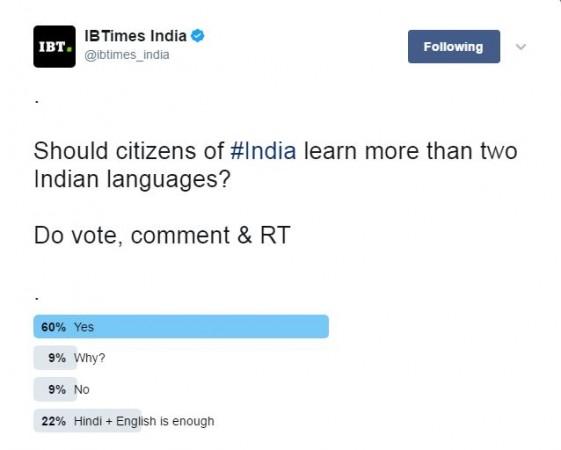
Italian film director Federico Fellini once said: "A different language is a different vision of life," and we couldn't agree more. People are often in awe of those who speak various languages and while it may be "cool" to do so, knowing more than one language is also known to have numerous health and social benefits.
School and college-going students are often encouraged to learn different languages for the same reason. Knowing more than two languages not only makes things easier, especially when you move to another country or even another state when it comes to India, it is believed that knowing more languages also affects one's personality and intellect.
In tune with it, International Business Times India conducted a Twitter poll, asking users of the microblogging site whether citizens of India should learn more than two Indian languages. And like most people worldwide, Indians too believe that knowing more number of languages is beneficial.
While 60 percent of the people who took the poll said that Indians must learn more than two languages, 22 percent believed that considering most of the people in the country spoke English and Hindi, knowing a third language wasn't really necessary. However, there were a few – 9 percent – who said that people in India must not learn more than two languages, another 9 percent couldn't understand the point in learning over two languages and wondered "why?"
Most people in India believe that one should try and learn more languages considering the number of languages spoken in the country. Each state speaks a different language, which too can be broken down into several dialects. "The more languages you know, the better you can communicate with other people. When you speak to someone in their native language, there is much better understanding," said a Quora user.

A study by researchers at Northwestern University also found that children who speak more than one language tend to be better at multitasking and are also better when it comes to concentration and attention than children who are fluent in just one language.
"Bilingualism serves as enrichment for the brain and has real consequences when it comes to executive function, specifically attention and working memory," Dr Nina Kraus, the lead author of the study, explained.

"The bilingual juggles linguistic input and, it appears, automatically pays greater attention to relevant versus irrelevant sounds," team member Dr. Viorica Marian added. "Rather than promoting linguistic confusion, bilingualism promotes improved 'inhibitory control,' or the ability to pick out relevant speech sounds and ignore others."
Additionally, knowing multiple languages also stalls the onset of mental conditions like dementia and Alzheimer, and also improves memory, according to Examined Existence. It also makes a person more open to other cultures and receptive to their ideas.
Do you also think Indians should know more than two languages? Let us know what you think in the comments section below.

















